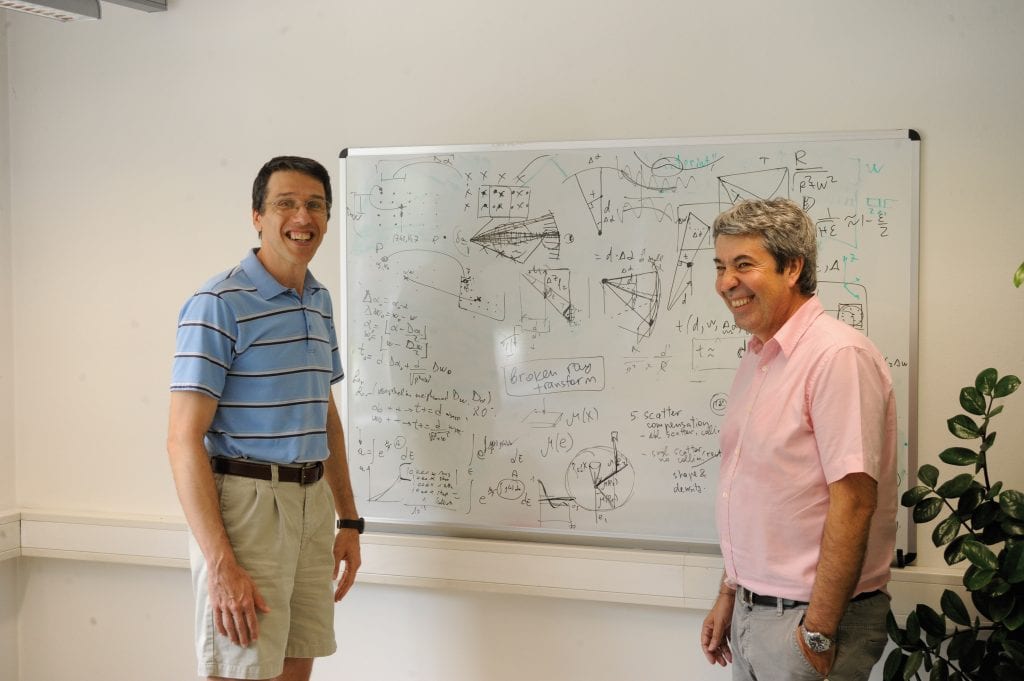Math Professor Wins World Renowned Prize

UCF professor of mathematics, Alexander Katsevich, Ph.D., recently won the highest prize in the world for the forestry industry, the 2016 Marcus Wallenberg Prize. This prize recognizes, encourages and stimulates path breaking scientific achievements that contribute to broadening knowledge and technical development within the fields of forestry and forest industries.
Dr. Alexander Katsevich, who also serves as the Chief Technology Officer of iTomography Corp., a company he co-founded, and his co-laureate Dr. Federico Giudiceandrea, the CEO of Microtec (Italy), developed a high-speed X-ray based computed tomography (CT) scanner for whole tree logs. The scanner is used to identify knots, cracks and rot in tree logs and can increase the value of the sawn products by at least 10 percent. Wood industries in the U.S., Chile, Germany and France have invested in the Microtec CT Log scanner to make the most of the resource.
CT is an imaging technology that produces 3D representations of objects, based on multiple scans of the object from different directions with penetrating X-ray radiation. In most modern industrial and medical CT scanners, the X-ray is emitted from the source in a cone-beam shape, and the images will be reconstructed after the object is moved through the beam.
Earlier known algorithms to obtain 3D pictures in CT were reliable for small cone angles. But wider cone angles, which would come from faster scanning of tree logs as required by sawmills, would result in a loss of image quality.
Dr. Katsevich explained that “… as opposed to, say, conventional chest x-rays, CT images are not captured directly, but instead are reconstructed by a sophisticated algorithm. At the heart of every CT scanner there is an image reconstruction algorithm. The scanner that Dr. Giudiceandrea had in mind was supposed to have high throughput, and this placed very stringent restrictions on the algorithm. I developed an algorithm, which satisfied all the requirements.”
Dr. Katsevich found an exact analytical reconstruction algorithm, which is known today as Katsevich’s Algorithm. It not only solves the cone-beam image reconstruction problem but also is better suited for situations where fast movement of tree logs is necessary. In collaboration with Dr. Katsevich, Dr. Giudiceandrea implemented the Katsevich Algorithm on a novel Microtec scanner. This scanner has now been further refined and marketed worldwide.
Dr. Katsevich and Dr. Giudiceandrea will receive the award from the King of Sweden, at the Marcus Wallenberg Prize Event. The event includes the award ceremony, reception with the King and Queen of Sweden, banquet and symposium and takes place on Oct. 10-11 in Stockholm, Sweden.
“I still find it hard to believe that I won the prize” said Dr. Katsevich, “…despite all the congratulations that I received from my friends, family, colleagues, it is still hard to comprehend what happened. This is just surreal, and I am very honored by the prize.”
Dr. Katsevich graduated in applied mathematics from Moscow Institute of Oil and Gas in 1988 and got his Ph.D. in mathematics at Kansas State University in 1994. From 1996 to 2008 he was an assistant and then associate professor at the UCF Mathematics Department. In 2008 became a full professor.
Dr. Katsevich’s research deals with tomography, Radon transforms, medical imaging, and microlocal analysis. He has received several awards, among others the Best Paper in Tomography Award at the IXth International Conference on Fully 3D Image in Lindau, Germany, in July 2007.
As CTO of iTomography since 2011, Dr. Katsevich has been developing and commercializing his CT technologies. The motto of iTomography is “From Theoretical Breakthroughs to Industry Adoption.” This outstanding recognition of Dr. Katsevich and Dr. Giudiceandrea demonstrates how the ideas developed at UCF can be successfully commercialized and lead to industry breakthroughs.
